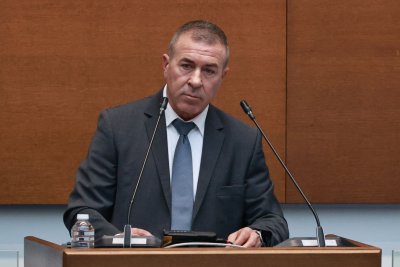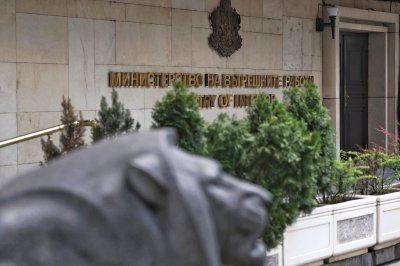Annual inflation in Bulgaria will exceed previous forecasts and will be higher than the eurozone average, said Bulgarian National Bank (BNB) Governor Dimitar Radev in a special interview for BNT. According to him, the 2026 budget faces serious challenges. Radev believes that while the process of increasing incomes should continue, the expenditure side of the budget should be managed prudently.
The interview was conducted by Nadya Obretenova.
BNT: What can the government do now to contain the process, so that we don’t keep hearing every day that prices are rising, inflation is accelerating, and certain groups of the population can no longer cope with the higher cost of goods and services?
Dimitar Radev, Governor of the Bulgarian National Bank:
“First, the irresponsible talk about this issue should stop — it also has an effect. Next, efforts should focus on the factors contributing to price increases. With the upcoming adoption of the budget, we must break the trend we have observed in recent years — namely, pro-cyclical fiscal policy, which is itself a factor driving prices upwards. So there are indeed steps that need to be taken, and we shall soon see whether they will be.”
BNT: Last year, the Central Bank warned that the budget was not being designed in a way that stabilises the economy and fiscal policy. What are your warnings now, as the 2026 budget — the first within the eurozone — is being prepared?

Dimitar Radev:
“It’s no secret that the budget is facing serious difficulties. The roots of these problems lie in the political crisis after 2020 and the resulting loosening of fiscal discipline. There has been a clear trend of deterioration in recent years, and it must be reversed. In that sense, the 2026 budget will be a key indicator of whether there is enough common sense and political will to make that happen.”
BNT: Inflation continues to rise. How do you expect Bulgaria to end 2025?
Dimitar Radev:
“We will end the year with inflation higher than in the eurozone, but still within manageable limits. There will be no particular drama, at least based on the official data. Of course, public debate about high prices in the shops will continue, but from a macroeconomic perspective this will not represent a serious imbalance.”
BNT: On our way to the eurozone we had to meet certain criteria and parameters for inflation and the budget deficit. Now that we are members, do we still have to meet those same benchmarks?
Dimitar Radev:
“Yes, of course. In fact, even outside the eurozone context, pursuing sound national policies remains extremely important. We must not forget that over the years fiscal policy has been one of Bulgaria’s strongest comparative advantages — we must not lose that. It means continuing to conduct sensible macroeconomic and fiscal policies. So yes, even outside the eurozone framework, we must maintain responsible national policy in all key areas.”
BNT: We see what is happening in France. Some analysts warn that France could trigger certain processes within the eurozone. Could this have an impact on Bulgaria and its economy?
Dimitar Radev:
“What is happening in France largely reflects structural fiscal imbalances. Should we be concerned? Yes. Should we expect catastrophic scenarios? Certainly not. We must remember that we are talking about an economy with huge capacity, including the ability to deal with such problems. If there is a lesson to draw, it is the need for swift reforms, better coordination, and an understanding that sweeping fiscal problems under the rug inevitably leads to serious — even political — upheavals.”
BNT: Critics of Bulgaria’s eurozone membership point to what is happening in France and argue that Bulgaria may end up helping to bail out struggling economies. Is there any truth in that, Mr Radev?
Dimitar Radev:
“No, definitely not. If we ever reach a point where Bulgaria has to save France, that would simply be a topic fit only for speculation.”
BNT: About ten days ago an IMF mission visited Bulgaria and recommended freezing public sector wages while raising taxes and the overall tax burden. Should Bulgaria follow these recommendations, and which parts of them might be worth adopting?
Dimitar Radev:
“We have the right to make our own choices. I believe that, as a result of the tremendous efforts made over the past — perhaps more than — twenty years, we have earned the right to take decisions on fiscal policy independently, without relying on external factors. Therefore, the decisions rest with us.
I think we now have an excellent opportunity to continue the process of increasing real incomes while at the same time rebuilding our fiscal buffers — provided we focus on the expenditure side of the budget and manage it in the most prudent way. In other words, this can still be done.
However, if the problems continue to escalate, we will find ourselves in a situation where there are no good options left — something we are already witnessing elsewhere. You mentioned France, but we have a similar example much closer to Bulgaria.”
BNT: You mean Romania?
Dimitar Radev:
“Yes.”
BNT: How close are we to a “Romanian scenario”? We already see rising public-sector salaries and a desire by the government to increase certain taxes.
Dimitar Radev:
“Both far and near — it depends on the perspective from which we look at the issue. Such a scenario will be impossible in Bulgaria if prompt measures are taken to reverse the negative trend in the country’s fiscal position observed in recent years. If we allow these problems to escalate, we will inevitably find ourselves on the path of what you refer to as the ‘Romanian scenario’.
You see, our revenue system, including the tax framework, is designed to ensure relatively smooth financing of public expenditure of up to around 40% of gross domestic product. If we sustain spending significantly above that threshold, two questions inevitably arise: how will it be financed? And the answers are not that complicated — through debt, through higher taxes, or through a combination of both. None of these are good options.
That is why the focus should be on containing fiscal expansion and reversing this trend of procyclical fiscal policy. In this sense, yes — I believe the 2026 budget is perhaps more important than any budget adopted over at least the past five years.”
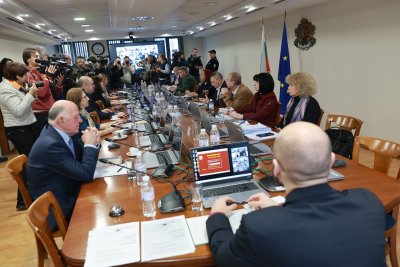

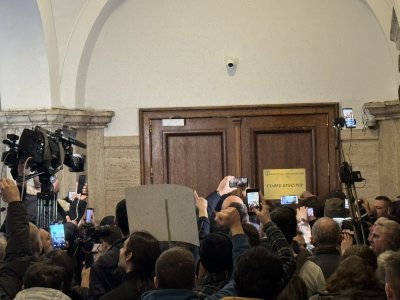
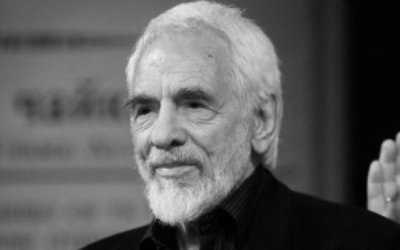
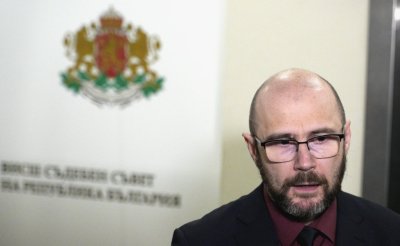






 Чуй новините
Чуй новините Подкаст
Подкаст





